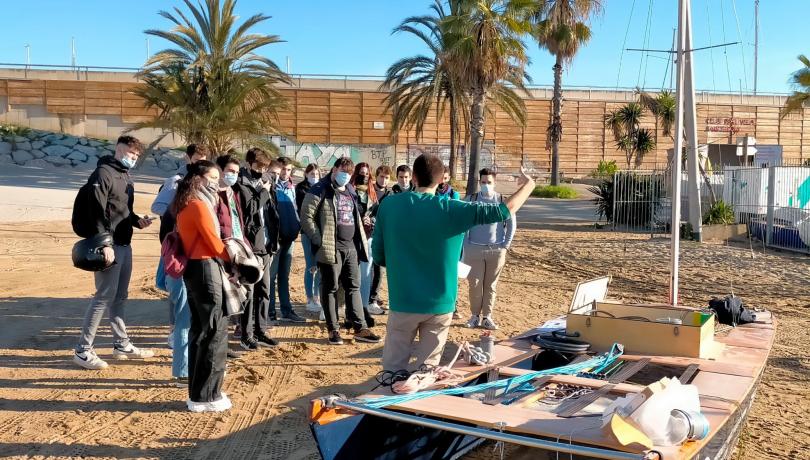The data obtained through the initiative will be used to better understand the physical processes that rule Barcelona's beaches, for example, during storms.

Last 27 December officially kicked off AULAMAR, an educational project coordinated by the Institut de Ciències del Mar (ICM-CSIC) and funded by the BIT Habitat Foundation that seeks to promote knowledge of Barcelona's coastline among the young through the use of sustainable recreational boats. It is aimed, in particular, at secondary school students, who will be made aware of the importance of sustainable use of the coast.
In addition to the ICM-CSIC, other participants in the project include the Barcelona Faculty of Nautical Science (FNB-UPC), the Marine Technology Unit (UTM-CSIC), the Institute of Advanced Architecture of Catalonia (IAAC), the Barcelona Sailing Club (CPVB), the Barceloneta neighborhood fishermen's association (Cap a Mar), the Tarpuna sustainable initiatives cooperative, and more than a hundred students from different secondary schools.
The state of Barcelona's coastline
The maritime tradition has historically conditioned Barcelona's economic and social growth. As a result of the pressure caused by human activity and climate change, Barcelona's coastal ecosystem is now "extremely vulnerable", according to Josep Lluís Pelegrí, research professor and director of the ICM-CSIC.
"Paradoxically, oceanography is more technologically prepared to study the open sea than the coastal environment. In this context of environmental vulnerability, we must drastically improve our knowledge of the state and evolution of the coastal ecosystem, so constant monitoring is necessary, which is possible not only through scientific projects, but also through educational initiatives such as AULAMAR," adds Pelegrí.
A pilot programme
AULAMAR is a pilot coastal water monitoring programme that involves the young in a real oceanographic research project. It seeks to strengthen the relationship between this group and the Barcelonian coastline through a more open, inclusive and participatory science. It also aims to obtain oceanographic data that will help to better understand the social and environmental impact of human activity and climate change on coastal ecosystems.
As part of this initiative, scientists will work alongside more than a hundred students from different institutes in the construction and development of a low-cost system for obtaining oceanographic data from the Barcelona coastline.
"The measurement prototypes developed will be installed on sustainable recreational boats such as sailboats, SUPsurfs, kayaks and other fishing boats," explains Raul Bardají, from the UTM-CSIC.
These devices will collect data on, for example, the type of waste found on Barcelona's beaches, which will make it possible to obtain a more complete picture of the state of Barcelona's coastline. In addition, according to the ICM-CSIC researcher Nina Hoareau, "the new records will provide us with information on the physical processes that rule the coastline, which will help us to better understand the distribution of wastewater during rainfall events or that of plastic waste in certain areas of the coast, among others".
Ignasi Vallès, also a researcher at the ICM-CSIC, is convinced that awareness-raising require emotion and participation, and concludes that "AULAMAR is an integral project that empowers students, which is key for them to be aware of the importance of their work for the scientific community and, ultimately, for society. We are convinced that, in this way, we will become the blue citizens that Barcelona needs so much".
This initiative fits perfectly with the philosophy of the United Nations Decade of Ocean Science for sustainable Development (2021-2030), in which Barcelona participates through the Ocean Cities programme, an international network created by the ICM-CSIC to promote sustainable ocean cities.